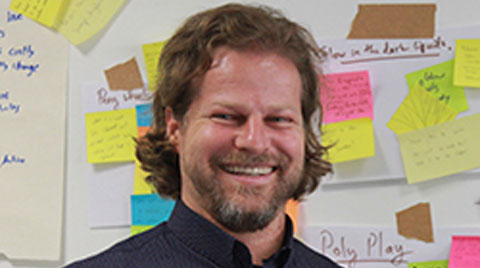"Innovation is impossible without new scientific ideas"

Brian A. Korgel, professor in Chemical Engineering at the University of Texas, participated in the first edition of Nanotechnology Innovation, a course which combines key concepts in nanotechnology with principles of innovation, creativity, business creation, entrepreneurship, intellectual property and the global economy in general.
18/07/2014
During the month of June, the UAB Faculty of Science played host to the first edition of the Nanotechnology Innovation course, organised jointly by the Universitat Autònoma de Barcelona and the University of Texas, in collaboration with the Barcelona Nanotechnology Cluster Bellaterra. Professor Brian A. Korgel of the University of Texas, together with Dr Gemma Garcia of the Department of Physics and adjunct coordinator of the degree Nanoscience and Nanotechnology, was in charge of directing the programme.
What were the main objectives of this course?
The whole programme was prepared in a very organic, flexible and participative manner. Without forgetting some of the theoretical concepts which are essential in nanotechnology and engineering, we focused more on showing a more creative and entrepreneurial side of science. With this in mind we visited business incubators, technology centres and entities such as the UAB Research Park and Barcelona Activa, with the aim of showing students the innovative ecosystem surrounding them.
How did this collaboration among the organisers come to be?
I had been planning to organise a course on nanotechnology innovation at the University of Texas. But I realised that many students wanted to study abroad, to do an exchange programme. So I thought about collaborating with another university. The UAB has a bachelor's degree in nanoscience and nanotechnology, and that made preparing this course beneficial for both parties.
The course included students from both universities. What are the advantages of having students from different nationalities work together?
A very important part of the course has been learning to work in groups. And the interactions between students from different countries is the best way to connect them to a more global way of thinking. Clearly, the advantage consists of uniting two different cultures and experiences and having them work together. This way not only their communicative skills are improved, but they also learn to work professionally with total strangers. And that is very enriching.
Why is it important for students to acquire an entrepreneurial look on things?
I founded two companies without having any specific type of training. However, the world is changing and there is an increasing amount of opportunities for people who do not want to limit themselves to working in big companies and would rather develop their own projects. If we show these students from day one that the possibility exists, they will have the opportunity and the tools to continue on with their ideas. The goal is to open their horizon.
What implications does nanotechnology have in economic and social developments?
It is the future. It is not yet the present. What is special about nanotechnology, and I believe that makes it particularly interesting for the students, is that it has an infinite number of applications. It not only deals with creating materials containing new properties, it can be applied to so many different areas. And it is precisely this wide range of applications that makes it important to study in the classroom the ethical and social issues which may arise when discoveries are made.
What does your research at the University of Texas consist in?
Essentially, my research group deals with the creation of materials containing totally new properties. At the moment, we are working on paints and dyes with applications for solar panels. Another line of research is the improvement of batteries and, finally, we have a line dedicated to nanomedicine and cancer detection. Although it is true that lately our line of work tends to focus on the environment and the sustainable energy sector, one of the advantages of nanotechnology is that it doesn't tie you down to just one sector.
In 2001 you founded your first company, Innovalight, and in 2007 you created Piñon Technologies. Were the two experiences similar?
Innovalight is dedicated to the commercialisation of my research on nanocrystal dyes which improve the energetic efficiency of solar panels. Piñon Technologies however is based on the production of high performance transistors. The business models of the two companies are completely different and both have been successful for distinct reasons. This experience helps me to demonstrate that there is no one only successful model.
In terms of transferring knowledge from the university to the market, what do you think is the main difference between the US and Spain?
I consider the main difference to lie in the very little private funding research receives in Spain. Or practically none, should I say.
Do you believe universities must be the country's main source of scientific and technological innovation?
They form a very important part. Innovation is impossible without new scientific ideas. If a country wants to have a good business network with companies capable of appearing from nowhere and growing until they turn into large companies, it must invest in cutting-edge technology. But in this process there is the need for good ideas and an innovative spirit, not only great scientists. And that is what we wanted to transmit in this course.